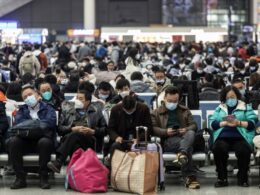Financial Times
April 17, 2022
If the economic and social disruption caused by China’s “zero Covid” policy has taught the world anything, it is this: it is no longer possible, if it ever was, to combat Covid using suppression alone.
Ways to live with the virus, rather than to cower from it, must be found.
If the economic and social disruption caused by China’s “zero Covid” policy has taught the world anything, it is this: it is no longer possible, if it ever was, to combat Covid using suppression alone.
Ways to live with the virus, rather than to cower from it, must be found.
Although lockdowns are an effective way to slow and suppress the spread of coronavirus, they come with heavy economic and social costs.
In the UK, they have aggravated existing social inequalities in education, and taken a heavy toll on healthcare infrastructure as well as the country’s mental and — thanks to the backlogs in treatment of other conditions — physical health.
As such, the government’s decision to abandon most restrictions in England on February 24 this year was broadly well-founded. But it has all too often been overzealous.
Onerous requirements such as stay-at-home orders were tossed out but practical and unobtrusive non-pharmaceutical interventions, such as the requirement to wear face coverings on public transport and in large indoor settings, were also ditched.
So was the vast apparatus of state tracking erected during the pandemic.
The UK government’s correct diagnosis of the social cost of lockdowns has also gone hand-in-hand with a Panglossian view of the price involved in living with the virus.
A world in which Covid circulates freely is one in which a greater number of working days are lost to illness, even though that illness will be mild for most vaccinated people.
Businesses from supermarkets to airlines, as well as schools and hospitals, are struggling with increased staff absences.
States everywhere are grappling with a permanent increase in the financial and physical demands on healthcare infrastructure and capacity.
The government has largely shut its eyes to the problem, by ending availability of free Covid tests and defunding a number of monitoring studies.
But depriving the state of its ability to see pressures on the NHS and on schools before they happen does not mean that the government is able to avoid paying for them when they arise.
Matthew Taylor, head of the NHS Confederation, warned that the increased demand for beds and staff shortages due to illness meant that “this Easter in the NHS is as bad as any winter”.
A return to the restrictive policies of 2020 and 2021 is undesirable. Social exhaustion and the damage to the Conservative government’s authority from the “partygate” affair — with the prime minister and the chancellor fined for breaching lockdown rules — make it probably unenforceable. But the UK’s approach requires a moderate rethink.
A return to the restrictive policies of 2020 and 2021 is undesirable.
Relatively non-intrusive regulations, such as requirements to wear masks on public transport, and stronger requirements on ventilation within buildings, already in place in Scotland, should be reintroduced and properly enforced and public information campaigns renewed.
The apparatus of monitoring the number of Covid tests needs to be restored, and the demands on capacity in schools and hospitals must be acknowledged.
Relatively non-intrusive regulations, such as requirements to wear masks on public transport, and stronger requirements on ventilation within buildings, already in place in Scotland, should be reintroduced and properly enforced and public information campaigns renewed.
The exit from Covid restrictions was, in large part, driven by the desire among some Conservatives and the UK Treasury to end Covid-related spending.
The exit from Covid restrictions was, in large part, driven by the desire among some Conservatives and the UK Treasury to end Covid-related spending.
That inevitably also restricted the options available to the UK’s devolved governments.
But living with Covid comes with a cost. There is a worthwhile debate about how best to meet that cost — whether it should be borne by individual households and businesses or collectively by governments — and how UK institutions like the NHS need to be reformed and retooled in light of the new challenge.
But living with Covid comes with a cost. There is a worthwhile debate about how best to meet that cost — whether it should be borne by individual households and businesses or collectively by governments
— and how UK institutions like the NHS need to be reformed and retooled in light of the new challenge.
But Britain’s government, like others across the world, must accept this trade-off, rather than seeking to hide from it.
But Britain’s government, like others across the world, must accept this trade-off, rather than seeking to hide from it.
Originally published at https://www.ft.com on April 17, 2022.
Names mentioned
Matthew Taylor, head of the NHS Confederation,












